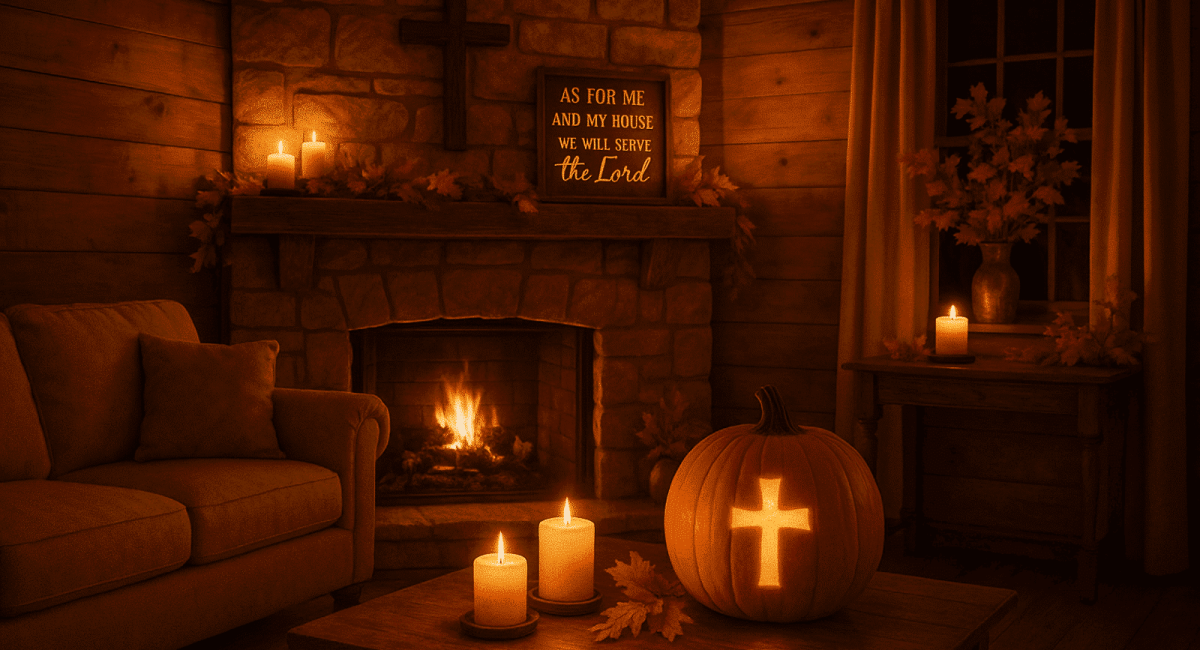Is Halloween a Threat, or an Open Door? Navigating the Spooky Season with a Christ-Centred Home –
October rolls around, and with it, the familiar scent of woodsmoke, cinnamon spice, and a tricky theological quandary for the Christian home. When the supermarket aisles are filled with ghouls and plastic spiders, and the neighbourhood starts glowing with carved pumpkins, how do you, as a Christian seeking to honour Christ in all things, respond? Is this cultural phenomenon something to be shunned completely, or is there a way to thoughtfully engage? Should we hide, host a Light Party, or engage? The answer is rarely simple. Navigating Halloween as a Christian can be tricky. In this article, we’ll be dissecting a grace-filled, Christ-centred approach that shines light in the darkness and honours God in every autumn season.
Table of Contents
ToggleWithin our faith community, responses to Halloween are as diverse as the traditions themselves, ranging from outright rejection, a conscientious choice to avoid anything that hints of darkness, to a more thoughtful engagement that seeks to redeem the cultural moment. For our family, the approach is always to put Christ at the centre, choosing conviction over cultural pressure.
The Cultural Significance of the Spooky Season
Before we can decide how to respond to Halloween, we must acknowledge the magnetic role it plays in our broader culture.
The season taps into something deeply human: a sense of mystery, adventure, and the thrilling boundary between the known and the unknown. For many, especially children, it’s a night of pure, harmless fantasy, fun costumes, and the simple joy of neighbourly interaction.
This is especially true here in the UK, where Halloween celebrations have experienced a meteoric rise. Once overshadowed by Bonfire Night, the spooky season is now a major cultural event. Studies show consumer spending on costumes, decorations, and sweets has soared, with some commentators even noting that Halloween-related search volume in the UK now rivals or surpasses Christmas in October. It’s an American import, certainly, but one that has taken root across Britain, creating a deep-seated cultural expectation. It’s no longer easy to ignore the knock on the door or the decorated homes on your street.
Common Christian Objections to Halloween
For those of us who choose caution, the objections are rooted in sound biblical and theological conviction.
The most common concern revolves around the holiday’s historical and thematic ties. Many Christians feel compelled to avoid Halloween due to its possible ancient origins in Samhain, a Celtic festival marking the end of the harvest and the time when the veil between worlds was supposedly thin. While historians debate how much Samhain directly influenced modern practices, the concern remains: why celebrate a holiday linked to pagan rituals?
More powerful, however, is the modern concern over celebrating darkness. As believers, we are called to “put on the armour of light” (Romans 13:12) and to “avoid every kind of evil” (1 Thessalonians 5:22). When the culture celebrates skulls, fear, and demonic imagery, the concern is that by participating, we are giving a tacit endorsement to things the Bible clearly warns us away from (2 Corinthians 6:14). For many Christian families, the decision to avoid the holiday is a desire to keep their children’s eyes and hearts fixed purely on the light, protecting their spiritual innocence.
The Case for Nuanced Engagement
Yet, a growing perspective argues that we must be careful not to let historical roots dictate our modern meaning and practice. The fact is, many of our beloved traditions, from Christmas trees to wedding rings, have pre-Christian origins that have been redeemed and reinterpreted over centuries.
The question moves from “Where did this come from?” to “What does it mean now, and how will I approach it?”
We are invited to thoughtful discernment. Rather than a blanket rejection based on fear, we can prayerfully ask: Does my participation, or abstention, glorify God? This kind of heart-level reflection, rooted in grace, allows us to navigate the season with a clear conscience.
Many churches and families are choosing to redeem the season by hosting “Light Parties”, fall festivals, or simply using the night for radical Christian hospitality. This approach highlights the beautiful freedom Christians have, a freedom to do all things “to the glory of God” (1 Corinthians 10:31). When done with clear conviction, we have the liberty to choose our path.
The Opportunity Within Darkness: Shining Light
Perhaps the most compelling argument for a nuanced approach is the opportunity it presents. Halloween’s focus on darkness, death, and fear perfectly parallels many essential biblical motifs. It is the season when the culture itself opens up a conversation about spiritual themes, good versus evil, and what happens when we die.
As Chris Witherall wrote in a powerful article on this topic: “Halloween gives us the chance to say: ‘Yes, the world is full of shadows,’ but then to present Jesus as its light.”
This is our calling: to be a light in the darkness (Ephesians 5:8). What better time than a season focused on shadows to embody that light? This transition provides practical symbols for our faith.
As our family seeks to honour God in every season, we display faith-based art in our home as gentle reminders of whom we serve. Our ‘Our Home Does Not Celebrate Halloween, But We Honour the Lord’ piece brings warmth and clarity each autumn, while our farmhouse-themed Christian wall art keeps Christ at the centre throughout the holidays. These visual declarations not only refocus our hearts but also serve as a gentle, positive message to anyone who steps through our door during this season.
Navigating Halloween as a Christian – A Note of Caution
Finally, let us always remember the importance of Christian liberty and respecting individual conviction. The Apostle Paul reminds us that what is freedom for one person may be a stumbling block for another. If your brother or sister-in-Christ chooses to go to a church-hosted Light Party, extend grace. If your dearest friend decides to turn off all the lights and pray, extend grace. Our goal is not uniformity of practice but unity in Christ.
I encourage you, dear readers, to discern and prayerfully choose your own path, rooted in grace and love. Whether you choose to use a festive pumpkin to share tracts or avoid the day entirely, do so with a clear, God-honouring heart.
Conclusion
So, can Christians use Halloween as a springboard for meaningful gospel conversations? Absolutely. The culture is talking about death and the supernatural, themes Christianity tackles head-on with the ultimate message of victory in Christ.
May we take this opportunity to be bold and clear about the hope we carry. We serve a God who conquered the grave, and we are children of the Light.
During this autumn season, consider adding faith-based art to your home. It’s a beautiful, gentle way to declare your values, remind your family of the true source of light, and anchor your home in Christ’s love amidst the changing cultural winds.


